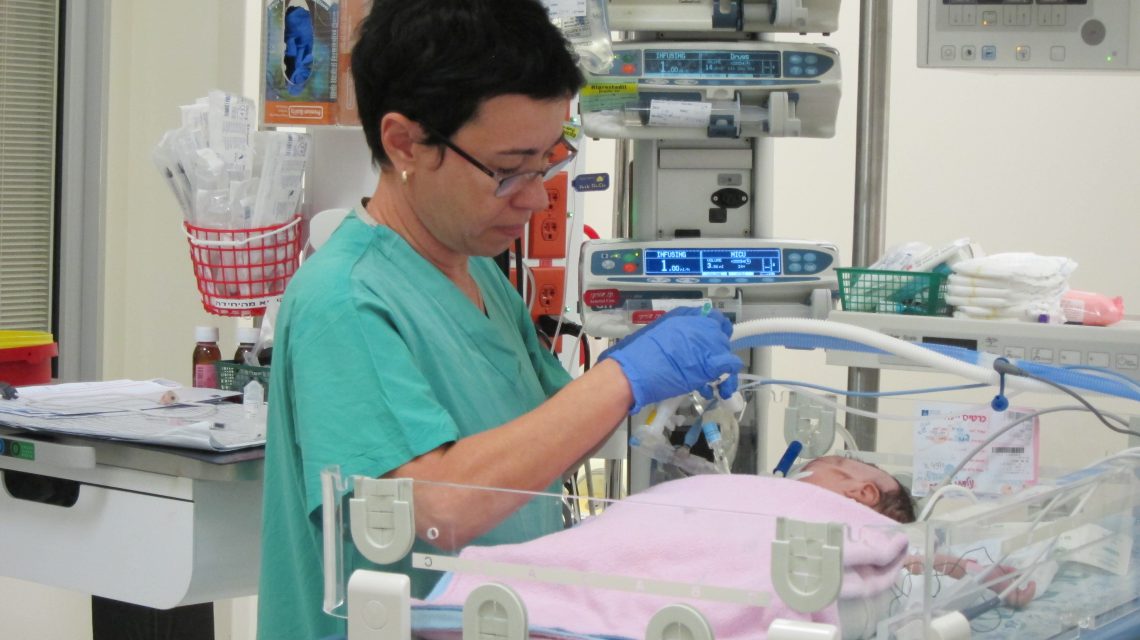
Tiny patients with big problems are now being treated in the new Neonatal Intensive Care Unit (NICU) at Hadassah Hospital Ein Kerem—the first of its kind in Israel.
The newest addition to Hadassah’s Neonatology Department, located in the Charlotte R. Bloomberg Mother and Child Center, the innovative NICU combines advanced technology with private rooms and dedicated multidisciplinary health care professionals, including a nutritionist and physical therapist. Most babies admitted to the NICU are premature, have low birth rates, and/or special conditions that need immediate specialized care. Typically, they are so small you could hold each one in your palm–if they weren’t attached to so many tubes and life-saving devices.
Let’s meet a few:
In Baby Room One, there is a baby boy that has no name yet; he is too sick to undergo a circumcision ceremony where he will finally get his name. His parents, in their forties, waited a long time to get the news that his mother was pregnant. And with twins! His brother is home from the hospital, but this other twin has a faulty connection between his esophagus and trachea. Air flows into his stomach instead of his lungs. This baby needs surgery, and a consultation for his heart and skeletal problems that are often linked to this esophageal problem. His distraught parents are counting on Hadassah’s team of experts to bring him through.
In Baby Room Two, there is a baby girl–the fourth child of a young religious family. Everything seemed fine during the pregnancy, but the nurses in the hospital where she was born noticed a blue tinge. She was rushed to Hadassah Ein Kerem where she was stabilized and will undergo heart surgery. Her parents are counting on Hadassah to bring her through.
In Baby Room Three, there is a baby girl from the Palestinian Authority, who was born with a vascular problem called “Vein of Galen Malformation.” Misshapen arteries in her brain are connected directly with veins, instead of capillaries, which help slow blood flow. This causes a rush of high-pressure blood towards her little heart and lungs. She has already had three brain catheterizations by Hadassah experts. Her parents are counting on Hadassah to bring her through.
 The new eight-bed NICU doesn’t just provide space and protection from infection to these at-risk newborns. It also allows parents to be integral parts of their care, explains NICU Director Prof. Smadar Eventov-Friedman. “Bonding with a sick infant is crucial,” says Prof. Eventov-Friedman. “Parents need to be close at hand for feeding and bathing and to become part of the baby’s care from the beginning.” Therefore, in addition to the complex machinery, such as mechanical ventilators and monitors for every life function, there’s an easy chair for mom and dad plus a small refrigerator to store supplements for the baby.
The new eight-bed NICU doesn’t just provide space and protection from infection to these at-risk newborns. It also allows parents to be integral parts of their care, explains NICU Director Prof. Smadar Eventov-Friedman. “Bonding with a sick infant is crucial,” says Prof. Eventov-Friedman. “Parents need to be close at hand for feeding and bathing and to become part of the baby’s care from the beginning.” Therefore, in addition to the complex machinery, such as mechanical ventilators and monitors for every life function, there’s an easy chair for mom and dad plus a small refrigerator to store supplements for the baby.
When Prof. Eventov-Friedman was a medical student, she relates, few of these babies would have had a chance of surviving. But the huge leaps in neonatal care have enabled sophisticated interventions that save babies’ lives and give them quality of life. “A child born with low weight or the need for surgical or subspecialist intervention has as good a chance of survival at Hadassah as in any top medical center in the world,” she says.
Hadassah’s Neonatology Department includes well-baby care and two intensive care units—the other, at Hadassah Hospital Mount Scopus. Close to 13,000 babies were born at Hadassah last year. While the vast majority are healthy and go home in two days, because Hadassah is a referral center for high-risk pregnancy, there is a spiraling need for intensive care, explains Dr. Benjamin Bar-Oz, head of the Neonatology Department.
